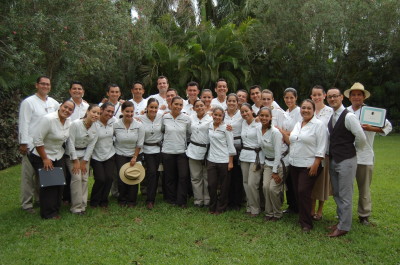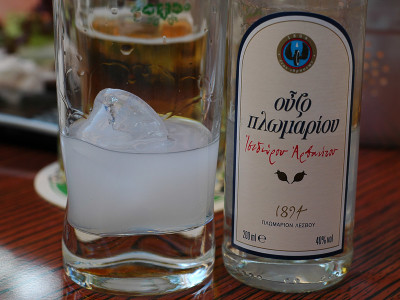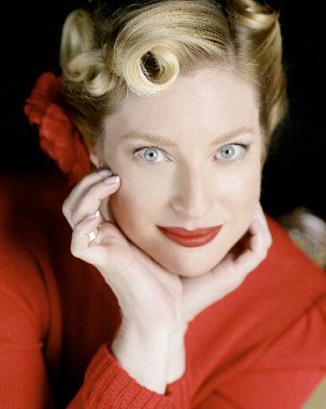It was somewhat disappointing to return for another round of training at a particular five-star hotel a year after training the butlers, only to find that, in this case, little had been implemented from the year before and morale was in the basement, with staff at each others’ throats and quite a few leaving or planning to leave. Hotel executives were similarly non-plussed: the guest feedback had taken a dive after soaring following the initial training; and against this backdrop, a new head butler, and those butlers who were working hard to provide good service, were soldiering on, heads down against the wind of fortune that found them somehow, yet again, in a group that had started in high spirits and ended up in service taking a back seat to politics and backstabbing.
Sound vaguely familiar? Seen shades of this before?
It is something we teach in butler classes, and how to avoid it. But the lesson had not sunk in, obviously, the year before. We also know that one cannot teach the paperwork side of a business if the technology of the business is not known and applied, because then nobody has time for the paperwork when there are so many flaps to handle because of poor service. And more fundamentally, one cannot teach the techniques and procedures of a business if ethics is unknown and unapplied.
All very well, but what is ethics?
It was something I applied to reach bottom on the low morale and (relatively) poor service among the butlers at this hotel…of which more later.
If one look up ethics in a dictionary, one discovers it is defined as morals. When one looks up morals, one is told it is ethics. Obviously, if the difference were understood, the writers of dictionaries would point them out. However, one person does seem to have separated out this time-honored philosophical conundrum: the controversial 20th Century American philosopher, L. Ron Hubbard. According to his writings, morals are the accumulated knowledge of a group (whether a civilization, culture, or smaller group) concerning dangers it has observed when certain actions are taken (e.g. taking a shine to your neighbor’s wife). These, and their positives, are then written into a moral code that is enforced by peer pressure and even written into laws.
Why?
Because it is found that when a moral code is violated, a group falls apart, it does not survive. So from a point of survival / continuance, one has to have some rules of the road for mutual interaction.
As groups do not write a law or moral precept for an action that its members do not engage in, it can be seen that the puritans, who enforced quite a few morals on each other and were considered moral people, were factually faced with and fighting rather a lot of immoral activity.
The same was true for butlers in private estates. They upheld very strict codes of conduct to the point of restricting the lives of the staff: any dalliance with a member of the opposite sex would result in dismissal, for instance, so butlers and household staff rarely married and put a tight lid on what is really a natural impulse.
Why?
Because centuries of bitter experience had proven that it was too difficult to provide quality service against the inevitably charged atmosphere of relationships being formed and breaking apart tumultuously (not to mention maids taking leave because they were suddenly “in the family way”).
So morals kept the ship afloat, so to speak, but at a cost of repressed family dynamics for the staff—sacrifices that anyone who has seen that classic butler film, Remains of the Day, will understand fully.
In the US, we have seen a strange moral code developed and enforced by the government based on political correctness that teaches the avoidance of certain words and punishes five-year-old boys for kissing little girls and parents for applying light discipline to their children.
So on one side, we have those who insist on morals that suppress natural urges and survival actions. Take Prohibition, for instance— people will drink, and no amount of laws and ransacking of bars with axes will do away with that. Prohibition was repealed eventually, and we have most people drinking socially and only a relative few drinking to excess or while driving (i.e. harmfully). The correct or workable moral precept not being “Nobody shall drink alcohol on pain of imprisonment,” but “enjoy drink in moderation, and don’t drink and drive.”
Meanwhile, at the other end of the spectrum, we have those who say morals are passé and should be abolished. Leading the charge in this camp are psychologists and psychiatrists, who since the passage of the Secondary Education Act in the United States in 1965, have inserted themselves into the US education system to the point where their group (including counselors) now outnumber teachers. They have abolished moral education in schools (what teaching does occur is along the lines of [actual example], “If your mother and father were in a boat with you and only two could survive, who would you throw overboard?”) and encouraged to “do what makes you feel good.” We do not find basic guidelines in text books or classrooms for young minds to consider, such as “do not engage in sex at the age of thirteen because you may become pregnant or catch a disease” or “do not take mind-altering drugs because they will destroy your mind” or “do not murder your fellow students with a Uzi when you are angry with them or the world in general.”
Is it any wonder, then, that we witness school shooters, drugs and sex in middle schools, and something like 20% of the student body on psychiatric drugs and most of them having taken some street drugs? Doesn’t seem like this no morals approach works either. But with two generations now exposed to this lack of “moral compass,” many homes are not providing this education either, so it falls to churches, synagogues, and mosques where people attend them.
Morals are vital to a society, but they have their frailties: principally, that they require ethics to steer them intelligently, or they become a rote and enforced action that does not always lead to the greatest good, happiness, and survival—and so people come to protest morals. Nothing that is enforced wins in the long run. The answer is not to throw out all morals, but to understand and use ethics.
What then is ethics?
It is the real-time, self-determined assessment of what action to take that will result in the greatest good (survival or happiness, short- and long-term) for the greatest number of interests impacted by one’s planned action, and then taking that action.
A self-determined determination to do the right thing and a culture that encourages this drive are the missing ingredients in the work place. And that hotel with the butler department in a state of disarray was a prime example of ethics not being known and applied.
Staring aghast at such noisy and non-productive conflict, where does one begin to isolate the problem?
Simple, really: Just look and listen to what is actually in front of you. The first person who spoke to me on my arrival in the suite told me how he was going to leave the hotel’s employ as soon as he could and use our institute certificate to land a job at a certain palace because this current hotel was too terrible to be borne. This was an oddity that I just noted: we all have bad hair days, and making inappropriate and negative comments does not mean the sky is falling.
The next time he spoke to me, however, he said the very same thing, in case his message had not arrived the first time. Every time he spoke thereafter, usually in the presence of his colleagues and in a loud voice, it was to cast aspersions on and deride his workplace. About the third time this occurred, I pulled him up sharply and he reigned in his exuberant dysphemisms (the opposite of “euphemisms,” and where “dissing” could have come from, if it hadn’t come from a shortening of “disrespect”).
I then noticed that he was chronically off base in his understanding of the materials he was being taught in the classroom, usually loudly voiced before the teacher had finished speaking.
Then, two days after he had been rigorously drilled on a specific butler service (morning wake-up service), he managed to come into my suite quietly, place the newspaper and drink by the bed, and leave without saying a word or doing any of the other tasks normally associated with such a service—an explanation of the key error is not required. Thankfully, I happened to be awake already and called the butler coordinator to find out who had made such an error. I found myself stepping out of the shower ten minutes later to face an expostulating butler in my suite, asserting vociferously his inability to understand “how they (the night butler and butler coordinator) could have done such a thing to me.” I told him very sharply that I was not impressed with his trying to shift the blame so illogically to others for his own error and invited him to leave.
He had shown his true colors, warranting a closer inspection, and that is when the fun started. Because I had finally stumbled upon the tiger who had been busy chewing up the department over the past year.
Interviews with butlers and butler managers revealed a pattern of going to A and saying how bad B is, and then sidling up to B and saying how bad A is, and then standing back while A&B duke it out. It had become so bad that this individual had been expelled from his ethnic group and none of the butlers would talk to him. Yet they still allowed him to bad mouth others and the hotel, creating disaffection among the older and newer staff alike.
But that was only half of it, as is usually the case when there is this much smoke: he was also busy stealing from colleagues, from the hotel, and from guests, as well as borrowing money from many staff and not repaying it. And he took the night shift so he could pimp for guests as it was “good money.”
In investigating the situation, one other rather more “intelligent” (i.e. sneaky) butler was found to be the king of pimp but otherwise not obviously causing upset. I say not obviously, because when he was caught pimping for a royal personage and called on it, he of course denied all charges and persuaded the royal personage to express umbrage and threaten the welfare of the hotel manager and head butler who were closing in on the butler in question.
And so by threats and underhanded means, these two were working their self-centered ways and causing enough upset and confusion so that their own misdeeds were camouflaged.
So the question is, why did the butlers and the butler managers not stand up and protect each other and the department and hotel? The answer is reasonableness, meaning (not the use of reason to improve situations but) that they felt compelled to find reasons that would explain the existence of the non-optimum condition (“Oh, he’s just like that,” “his mother did not breast feed him enough,” etc.) and so allow it to continue instead of recognizing it for what it was and resolving it straight away.
As soon as I understood the situation, I opened their eyes to the subject of ethics (part of which has to include stopping plainly non-survival activity) and then took action to put an end to the rampage of these two individuals that put the hotel and it’s employees at risk (and guests, given these two butlers’ slack habits, such as cleaning fruit plates with their uniforms and filling coffee pots with tap water; and certainly pimping and the dangers such can entail) just so they could gain some advantage for themselves. I canceled their past Institute certificates and did not award them one for the current training, and alerted management to their specific crimes so standard Human Resource policies could be followed (which they were).
Again, had the butlers understood ethics, they would have acted to bring about an environment that supported good service, instead of allowing the perpetrators to continue to sour the environment and the hotel executives to scratch their heads about why the department kept being a sore spot and didn’t seem to respond to their managerial efforts.
Perhaps Thomas Jefferson summed it up best when he wrote in a letter to George Hammond in 1792, “A nation, as a society, forms a moral person, and every member of it is personally responsible for his society.”
There is more to ethics that is worth knowing, but of one thing it is plain: without ethics, we are flying blind in trying to run butler departments, hotels, and chains, where unethical individuals are allowed to run amok in the full knowledge of their colleagues; and certainly in nations, where promises made are not kept and where actions are taken that benefit only the few.
This particular story had a happy ending because ethics was known as a subject and applied. The results were best expressed in a letter received today: “I am so thankful for the training from the Institute. I have been able to deal with challenging guests and my colleagues as well. Many guests appreciate my service verbally and some by tips. But the most memorable are the guest feedback forms giving me 98% & 100%.” The Head Butler confirmed the week before that “We had a Gap Audit and the butlers scored 100% on room orientation and wake-up service, and all interactions between the auditor and the butlers were positive, with excellent feed back.”
How many more such stories are there where the bad hats are terrorizing the good citizens with impunity—and where someone could re-write the script so those in the white hats run the bad hats are out of the town so everyone can carry on with the business of simply servicing happy guests?
Copyright © Steven Ferry 2010 All Rights Reserved
This article also appeared in the January 11, 2010 issues of Hospitalitynet.com, the January 12, 2010 issue of 4Hoteliers.com, and HotelOnLine.com.





















